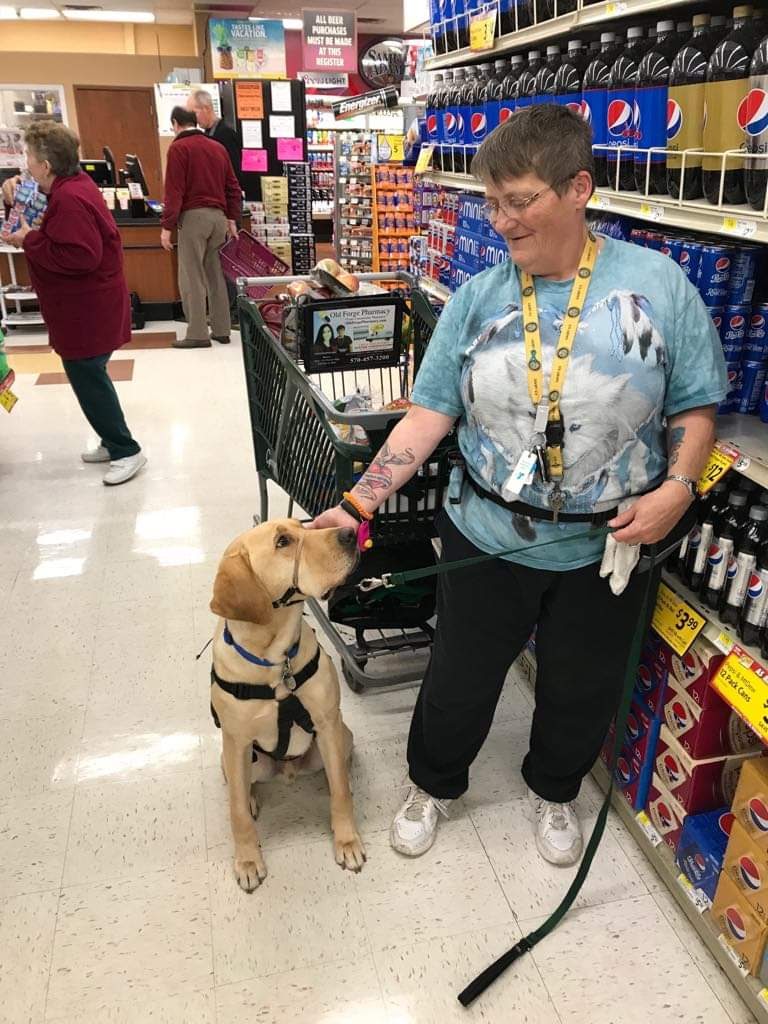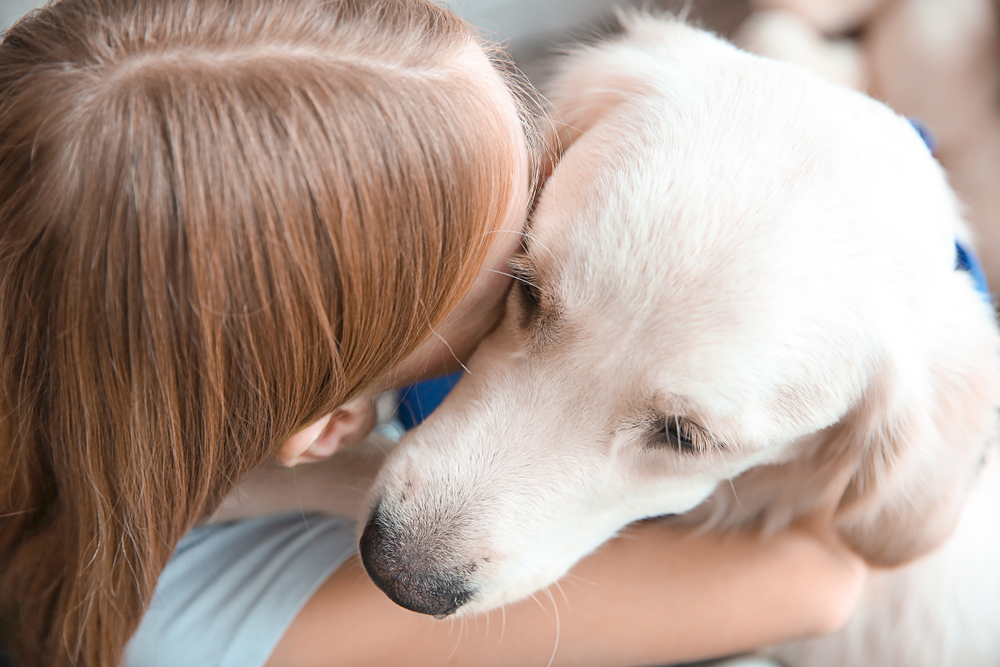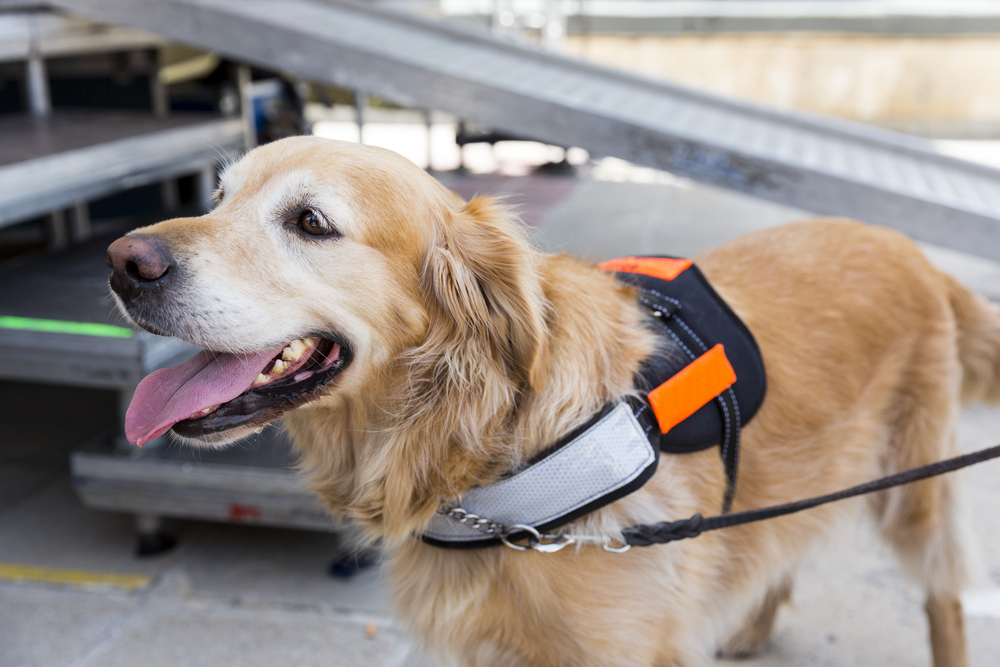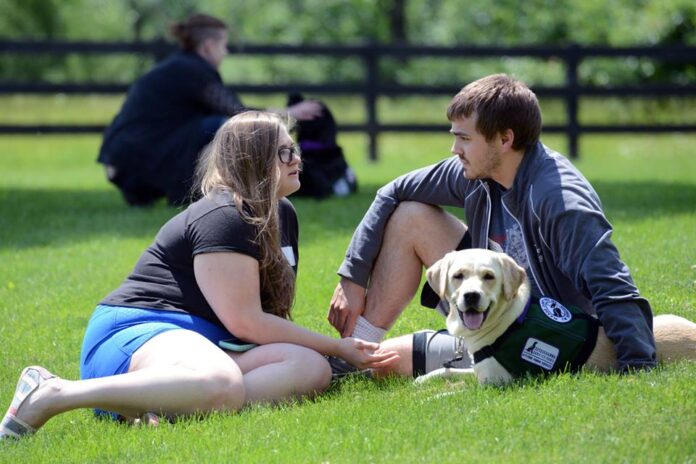Before Lisa, a 50-year-old Army veteran, partnered with her service dog, she hadn’t gone to a mall, ridden in an elevator, or shopped at her local grocery store for over 20 years in her Pennsylvania community. Because she suffered from Post-Traumatic Stress Disorder (PTSD), Lisa struggled with fear and anxiety in crowds and enclosed spaces. But since completing her service dog training last October, Lisa has done all of these activities and more—regaining her independence, thanks to her service dog, SSD Phelps.
Nathan, a Virginia resident who currently attends college in Iowa, was diagnosed with autism at age 9 and received his service dog, SSD Blake, at age 12. He admits he wouldn’t have made it through the turbulent middle and high school years without the support of Blake. Now 23, Nathan is getting his master’s degree and even started a YouTube channel called Service Dog Tales to share his experience.
These life-changing partner matches for Lisa and Nathan came about thanks to Susquehanna Service Dogs (SSD) in Grantville, PA. This nonprofit organization matches service dogs with children and adults with disabilities such as autism, cerebral palsy, hearing impairments, muscular dystrophy, psychiatric disabilities, seizure disorder, spinal cord injuries, and stroke. The goal? To help “human partners” become more independent in their daily lives.

Photo courtesy of Susquehanna Service Dogs
Since its founding in 1993, SSD has placed over 300 service dogs with people throughout Pennsylvania and the surrounding states. Typically, SSD places service dogs when they’re about two years old. They continue working for about 8-10 years, helping their partners live more independently rather than relying on assistance devices or other people.
Interestingly, SSD raises some of its dogs with the help of local college students through its Campus Puppy Raising Program. Eligible students raise and train eight- to nine-week-old puppies for about a year and half, teaching them “puppy etiquette,” social skills, and 26 different cues. They also attend training classes and provide socialization experiences in a variety of public settings. The Campus Puppy Raising Program initially kicked off by partnering with nearby Dickinson College and Penn State University. It has since expanded to include other colleges within a two-hour radius of its Grantville location. Depending on how the program is set up at each college, puppies might be raised by individuals or co-raised by a group. For example, Dickinson students co-raise and train puppies at the Dog House (a student club with a special interest house), while Penn State students each student receives his or her own puppy to raise.

As the dogs get a bit older, they also receive more specific training depending on the type of service they’ll be providing, such as a mobility dog, autism dog, or hearing dog. But generally speaking, dogs receive training in skills such as retrieving objects, opening and closing doors, doing balance work, pulling a manual wheelchair, turning light switches on and off, pushing buttons, and alerting for help.
Because the dog’s service training must closely align with the needs of the partner, it might take between two to three years to find just the right match. For partners who need a mobility dog, it can take up to four years due to the work the dog performs and the extra training required with a handled harness.
Although it costs more than $30,000 to train and place each service dog, SSD only requires partners to pay $5,000 with the remaining $25,000 covered by private and corporate donations. The nonprofit, which does not receive any government funding, provides a limited number of need-based scholarships to Pennsylvania residents, based on federal poverty guidelines. Ironically, insurance will pay for a $10,000 wheelchair, but it does not cover an assistance dog, says Deb Tack, Partner Coordinator with SSD.
After the extensive matching process, SSD requires partners to attend a 2½-week team training session where they learn how to handle their dogs in public, how to interact in public, and what to do if someone denies entrance to service dogs into a facility. At the end of the training, partners must pass an Assistance Dog Public Access Test to become a certified team.

To ensure the match continues to be a good one, SSD stays in frequent contact with partners, even going to their homes to help them practice working with their dogs. In fact, for the first year, SSD assigns a volunteer and staff liaison to regularly stay in touch and help with adjustments as needed.
While being matched with a service dog can be life-changing in many big ways, it’s often the small moments that make a huge difference.
“One of our partners became disabled later in life,” says Tack. “After his first weekend at home with his service dog, we asked him how it went. He said the highlight was simply being able to throw a ball and play with his dog. It had been years since he’d done that, bringing back long-ago memories of his dog Gus that he used to go fishing with.”
Sometimes those small moments are the life-changing ones.
Interested in learning more? Susquehanna Service Dogs is a fully accredited member of Assistance Dogs International, Inc. and full member of Animal Assisted Intervention International. Get complete details, including eligibility requirements, by visiting the Susquehanna Service Dogs website or calling (717) 599-5920.






